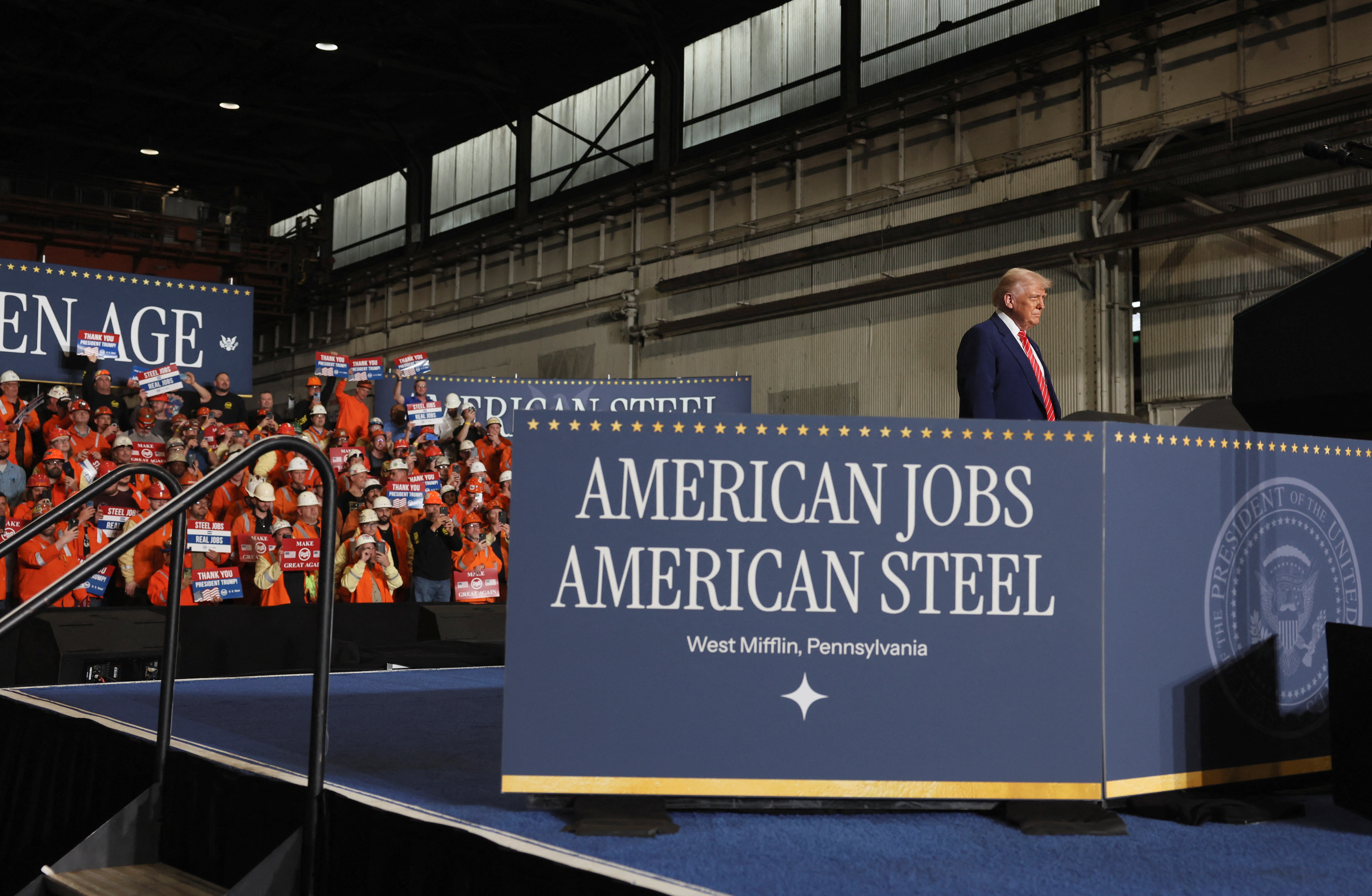The increase applies to all trading partners except Britain
The United States and European Union said trade talks advanced quickly and in the right direction on Wednesday, top negotiators said, despite a stumbling block posed by new U.S. metals tariffs.
President Donald Trump’s doubling of tariffs on steel and aluminium imports kicked in on Wednesday, the same day hisadministration sought”best offers”from trading partners to avoid other punishing import levies from taking effect in July.
The 27-nation EU’s trade negotiator, Maros Sefcovic, and U.S. Trade Representative Jamieson Greer said their meeting in Paris was constructive.
“We both concluded that we are advancing in the right direction, at pace,” Sefcovic told reporters. Technical talks are ongoing in Washington, he said, and high-level contacts will follow.
“What makes me optimistic is I see the progress … the discussions are now very concrete,” Sefcovic said, adding that he and Greer had agreed to restructure the focus of their talks.
Greer said the talks were advancing quickly and demonstrated “a willingness by the EU to work with us to find a concrete way forward to achieve reciprocal trade.”
Trump has made charging U.S. importers tariffs on goods from foreign countries the central policy of his ongoing trade wars, which have severely disrupted global trade flows and roiled financial markets.
The Republican president has long been angered by the massive federal trade deficit, saying it was emblematic of how trading partners “take advantage” of the U.S. He sees tariffs as a tool to bring more manufacturing – and the jobs that go with that – back to the United States.
However, the non-partisan Congressional Budget Office said on Wednesday that U.S. economic output will fall as a result of Trump’s new tariffs on foreign goods that were in place as of May 13.
In another sign of disruptions to global trade, concerns about the damage from China’s restrictions on critical mineral exports deepened, with some European auto parts plants suspending output and German carmaker BMW warning that its supplier network was affected by shortages of rare earths.
Separately, Trump said early on Wednesday that Chinese President Xi Jinping is tough and “extremely hard to make a deal with,” exposing frictions after the White House raised expectations for a long-awaited phone call between the two leaders this week over trade issues including critical minerals.
METALS JOLT MARKETS
The expected hike in the levies jolted the market for both metals this week, especially for aluminum, which has seen price premiums more than double this year.
Late on Tuesday, Trump signed an executive proclamation on a hike in the tariffs on imported steel and aluminium to 50% from the 25% rate introduced in March.
The increase came into effect at 12:01 a.m. (0401 GMT) Wednesday. It applies to all trading partners except Britain, the only country so far to strike a preliminary trade agreement with the U.S. during a 90-day pause on a wider array of Trump tariffs.
Sefcovic said he deeply regretted the doubling of the steel tariffs, stressing that the EU has the same challenge – overcapacity – as the United States on steel, and that they should work together on that.
About a quarter of all steel used in the U.S. is imported, and Census Bureau data shows the increased levies will hit the closest U.S. trading partners – Canada and Mexico – especially hard.
Canadian Prime Minister Mark Carney said intensive negotiations continued Wednesday on the new U.S. tariffs, which he considers illegal.
Canada is even more exposed to the aluminum levies as the top exporter to the U.S. by far at roughly twice the rest of the top 10 exporters’ volumes combined. The U.S. gets about half of its aluminum from foreign sources.
Global forex, bond and stock markets took the latest tariffs in their stride, with many investors betting that the current levies may not last and that the president will back off from such extreme actions.
HAVOC FOR BUSINESSES
Uncertainty around U.S. trade policy has created havoc for businesses around the world.
The new tariffs will affect “everything from autos to aircraft to aluminum beer containers to cans for processed goods to machinery and equipment,” said Georgetown University professor Marc Busch, a trade policy expert. “It’s hard to imagine what won’t be impacted in terms of manufacturing industries.”
The Aluminum Association urged the Trump administration to reserve high tariffs for bad actions including China and include carve outs for partners like Canada.
“Doing so will ensure the U.S. economy has the access to the aluminum it needs to grow, while we work with the administration to increase domestic production,” said Matt Meenan, the group’s vice president of external affairs.
‘BEST OFFER’ DUE DATE
Wednesday is also when the White House expects trading partners to propose deals that might help them avoid Trump’s hefty “reciprocal” tariffs on imports across the board from taking effect in five weeks.
U.S. officials have been in talks with several countries since Trump announced a pause on those tariffs on April 9, but so far only the UK deal has materialised and even that pact is essentially a preliminary framework for more talks.
Reuters reported on Monday that Washington was asking countries to list their best proposals in such key areas as suggested tariffs and quotas for U.S. products and plans to remedy any non-tariff barriers.
In turn, the letter promises answers “within days” with an indication of what tariff rates countries can expect after the 90-day pause ends on July 8.






Click here to change your cookie preferences